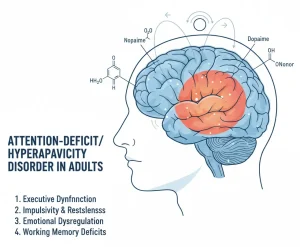Overview
Diagnosis
ADHD in adults can be hard to recognize, but core symptoms usually start before age 12 and continue into adulthood, causing challenges at work, home, and in relationships.
There is no single test for ADHD. Diagnosis typically involves:
Physical exam
Helps rule out other medical conditions that may mimic ADHD symptoms.
Information gathering
Includes discussing your current and past medical history, family history, and the timeline of symptoms.
ADHD rating scales and psychological tests
Used to collect and evaluate information about symptoms and their impact on daily life.
Other conditions that resemble ADHD
-
Mental health disorders: depression, anxiety, conduct disorders, learning/language deficits
-
Medical problems: developmental disorders, seizure disorders, thyroid issues, sleep disorders, brain injury, hypoglycemia
-
Drugs or medications: alcohol, substance misuse, or certain prescription medications
Treatment
Treatment of adult ADHD often combines medications, counseling, education, and skills training. While these treatments manage symptoms effectively, they do not cure ADHD. Finding the right approach may take time.
Medications
Stimulants
-
Most commonly prescribed for adult ADHD
-
Include methylphenidate and amphetamines
-
Work by boosting and balancing neurotransmitters to reduce symptoms of inattention and impulsivity
Nonstimulants and other options
-
Atomoxetine (Strattera)
-
Certain antidepressants, such as bupropion
-
These work slower than stimulants but may be suitable if stimulants are ineffective or cause side effects
Important considerations
-
Medication type and dose vary by individual
-
Monitor for side effects such as sleep problems, increased heart rate, or mood changes
-
Discuss benefits and risks with your healthcare professional
Psychological Counseling
Psychotherapy is a cornerstone of adult ADHD management and may include:
Cognitive behavioral therapy (CBT)
-
Helps develop skills to manage behavior and change negative thinking patterns
-
Improves time management, organization, problem-solving, and coping strategies
-
Can address coexisting conditions such as depression or substance misuse
Marital counseling and family therapy
-
Helps family members and partners cope with ADHD-related stress
-
Improves communication, conflict resolution, and problem-solving skills
Skills training
-
Time management, organization, and impulsivity control
-
Relationship management and strategies for controlling temper
Working on Relationships
Adults with ADHD may struggle with forgetfulness, missed deadlines, impulsivity, and unpredictable behavior, which can strain relationships at home, work, or socially.
Therapy and skills training can help:
-
Monitor and manage behavior more effectively
-
Improve communication, conflict resolution, and relationship skills
-
Educate family members about ADHD to support understanding and patience
Advertisement

